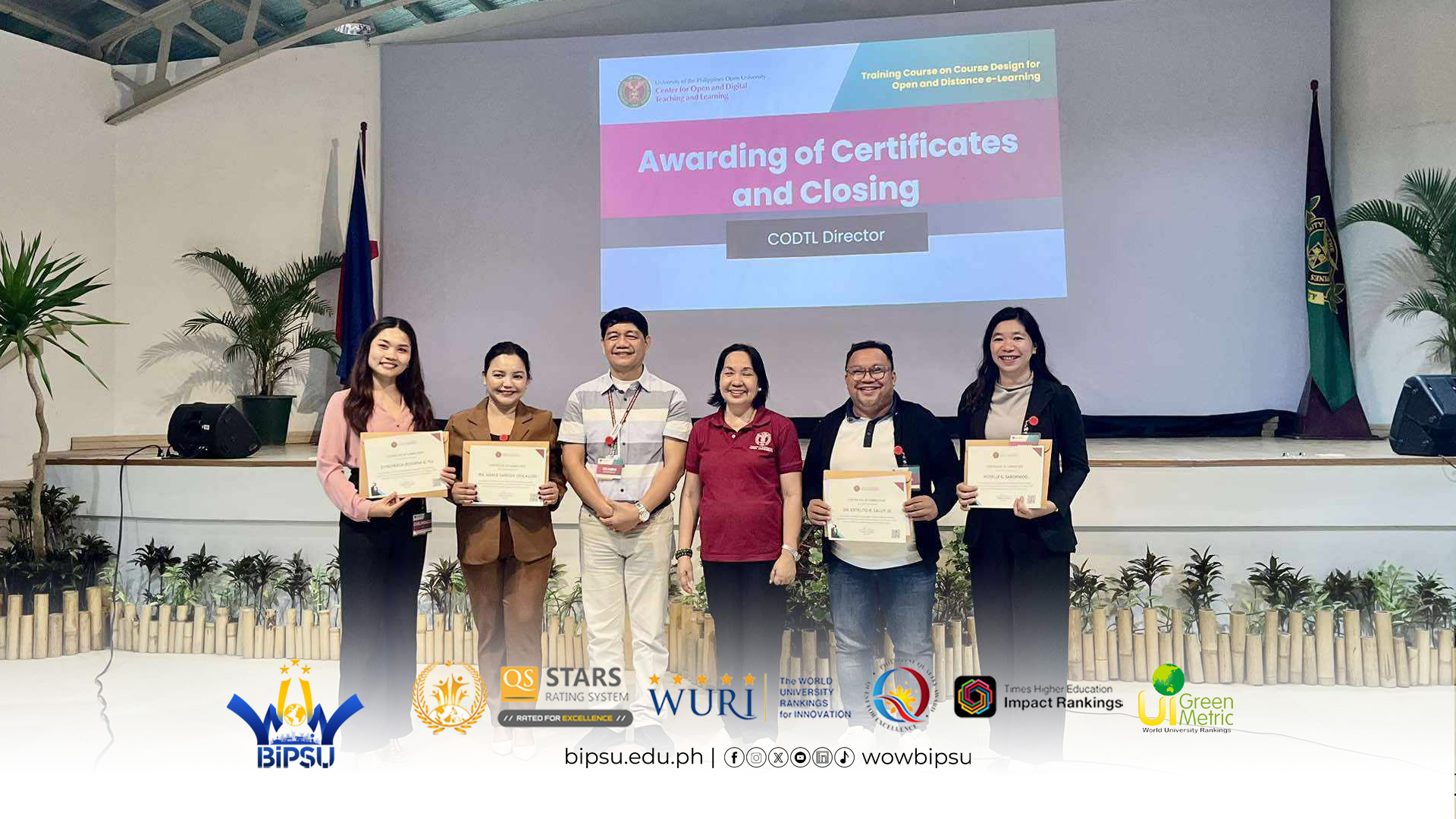Four faculty members of Biliran Province State University participated in the Training Course on Course Design for Open and Distance e-Learning (CD4ODeL) from February 3-12.
The BiPSU delegation included Dr. Estelito R. Salut, faculty member from the School of Management and Entrepreneurship (SME); Roselle G. Sabornido, chairperson of the Bachelor of Science in Criminology program; Ma. Grace Saňosa- Docallos, faculty member from the School of Arts and Sciences (SAS); and Chiejheaca Jehanna G. Yu, faculty member from the Biliran Campus School of Teacher Education (STEd).
The training, which aimed to enhance faculty competencies in designing and implementing open and distance e-learning (ODeL) courses, was conducted in a blended mode. Participants engaged in an online course from February 3-9, followed by onsite sessions from February 10-12 at the University of the Philippines Open University (UPOU) Headquarters in Los Baños, Laguna.
CD4ODeL is a specialized course that focuses on the principles and best practices of designing effective learning materials and activities for online, open, and distance learning environments, where students primarily access education remotely. The training was spearheaded by the Center for Open and Digital Teaching and Learning (CODTL) of UPOU and brought together educators from higher education institutions across the country, including De La Salle University, Don Mariano Marcos Memorial State University, and Benguet State University, among others.
In an interview, University President Dr. Victor C. Cañezo, Jr. emphasized the importance of equipping faculty members with the pedagogical underpinnings and theories that guide the practice of ODeL, especially after BiPSU institutionalized its implementation.
“We first implemented ODeL last school year, fully integrating it into our class system,” Dr. Cañezo explained. “I believe that in order to ensure quality education in this new learning modality, our faculty members must be well-prepared in course design, digital instruction, and assessment strategies.”
First introduced in July 2024, BiPSU's ODeL program reduced in-classroom learning hours to four or five hours daily, allowing students and teachers additional time for research, academic tasks, and extracurricular activities.
Meanwhile, during the online sessions, participants engaged in discussions on various topics, including frameworks for online teaching and learning, designing online courses, selecting digital learning resources, and assessing online learning activities. The face-to-face sessions further trained them in developing course guides, learning activity guides, and assignment guides to enhance student engagement and learning outcomes.
Several seasoned speakers led the discussions, including UPOU Chancellor Dr. Melinda Bandalaria, Professor Emeritus Dr. Alexander Flor, and Associate Professor Dr. Juliet Aleta Villanueva, who also serves as the deputy director of CODTL.
Aside from the training sessions, participants visited UPOU’s facilities, including the Information and Communication Technology Development Office (ICTDO), the Educational Media Production (EMP) Studio, and the UPOU Library, where they explored various resources for digital learning.
Estelito Salut expressed his appreciation to be part of the pioneering batch at UPOU for the eight-day training course on ODeL. “This training has been an enlightening experience, especially for us four representative participants, as ODeL remains a relatively new approach in the early stages of BiPSU-wide implementation,” Dr. Salut said.
Moreover, he also shared that throughout the program, it became evident that four key components must be addressed to ensure the successful integration of ODeL: software accessibility and usability, faculty readiness, student orientation and support, institutional policy framework.
“By addressing these critical areas, BiPSU can facilitate a seamless transition to ODeL and further enhance the quality of education through this innovative approach,” he added.
The participation of BiPSU faculty members in this national training aligns with the university’s EMpowerment program, which stands for Educational Mentoring for Faculty. This initiative aims to continuously enhance the teaching competencies of faculty members, ensuring they remain at the forefront of innovative and student-centered learning strategies.
[This aligns with Sustainable Development Goal (SDG) 4: Quality Education.]
-
 0
0
-
 1
1
-
 0
0
-
 0
0
-
 0
0
-
 0
0

